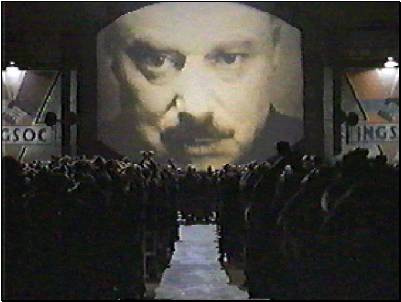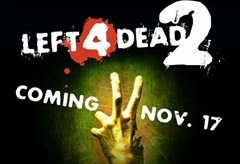This post has not been edited by the GamesBeat staff. Opinions by GamesBeat community writers do not necessarily reflect those of the staff.
 George Orwell's 1984 is, quite possibly, my favorite book of all time. I've read it at least 10 times, recently watched the film for the first time thanks to Netflix on my 360, and never cease to be fascinated and horrified by the atrocities that man can visit upon his fellow men in the name of power. But despite the book's vivid descriptions of torture and forced poverty, the most frightening thing about the nightmarish world of the Party is the ways that they were able to influence and control the minds of their followers.
George Orwell's 1984 is, quite possibly, my favorite book of all time. I've read it at least 10 times, recently watched the film for the first time thanks to Netflix on my 360, and never cease to be fascinated and horrified by the atrocities that man can visit upon his fellow men in the name of power. But despite the book's vivid descriptions of torture and forced poverty, the most frightening thing about the nightmarish world of the Party is the ways that they were able to influence and control the minds of their followers.
The scariest of those methods is the use of doublethink, a sophisticated method of mental trickery that is drilled into Party members from youth. Winston Smith, 1984's protagonist, describes it thusly:
To know and not to know, to be conscious of complete truthfulness while telling carefully constructed lies, to hold simultaneously two opinions which cancelled out, knowing them to be contradictory and believing in both of them, to use logic against logic, to repudiate morality while laying claim to it, to believe that democracy was impossible and that the Party was the guardian of democracy, to forget whatever it was necessary to forget, then to draw it back into memory again at the moment when it was needed, and then promptly to forget it again: and above all, to apply the same process to the process itself. That was the ultimate subtlety: consciously to induce unconsciousness, and then, once again, to become unconscious of the act of hypnosis you had just performed. Even to understand the word 'doublethink' involved the use of doublethink.
For those readers who are currently trying to figure out if they're still on the right website, let me assure you that you are, and here's my point – the above paragraph describes to a T most gamers' thoughts on sequels, doesn't it?
 We bitch and moan about the lack of creativity in the industry, we whine about how there aren't enough new IPs, and we complain about how the same ol' same ol' is ruining everything. Yet, what were the games that were getting the most buzz at E3 this year? Uncharted 2. Forza Motorsport 3. Modern Warfare 2. God of War III. Super Mario Galaxy 2. Halo 3: ODST. Final Fantasy XIII…I could keep going, but I think you get my drift – videogame companies have been able to use their power to convince us to hypnotize ourselves into believing two completely opposite thoughts at the same time.
We bitch and moan about the lack of creativity in the industry, we whine about how there aren't enough new IPs, and we complain about how the same ol' same ol' is ruining everything. Yet, what were the games that were getting the most buzz at E3 this year? Uncharted 2. Forza Motorsport 3. Modern Warfare 2. God of War III. Super Mario Galaxy 2. Halo 3: ODST. Final Fantasy XIII…I could keep going, but I think you get my drift – videogame companies have been able to use their power to convince us to hypnotize ourselves into believing two completely opposite thoughts at the same time.
So where does this internal dichotomy come from? First, it stems from the fact that video games, much more so than other forms of entertainment, require a large up-front investment of both money and time. When you buy a game, you're paying up to $60 for that bit of entertainment, and you know that it's going to require at least 10 hours for you to be sure that you've gotten your money's worth – whereas movies only cost $10 for two hours, and books and TV shows don't have to require any cash outlay at all (as long as you remember to patronize your local library, that is). With such a commitment to be made, most gamers seem to want to flock to the familiar – if you're pretty sure that you'll like what you're getting, there's much less risk involved. Hence the games with the biggest budgets are usually sequels, as companies certainly don't want to take the risks if we don't.
 On the other hand, even the most perfect videogame ever invented gets boring after a while, and we are always thirsting for new experiences. After all, if all anybody ever wanted to play were sequels, the only game in existence right now would be "Pong XXXII." Of course, not many people would be playing it these days – by now, the only innovation left would be to make it Full Contact Waggle Pong and it would take twenty minutes to put on your armor every time you wanted to play, not to mention every round likely devolving into something resembling the photo to the right. But, I digress.
On the other hand, even the most perfect videogame ever invented gets boring after a while, and we are always thirsting for new experiences. After all, if all anybody ever wanted to play were sequels, the only game in existence right now would be "Pong XXXII." Of course, not many people would be playing it these days – by now, the only innovation left would be to make it Full Contact Waggle Pong and it would take twenty minutes to put on your armor every time you wanted to play, not to mention every round likely devolving into something resembling the photo to the right. But, I digress.
Getting back to the sequels thing, another reason why gamers like them is because we tend to get attached to the characters we play with – again, a function of the length of time it takes to play the average game. Since we've been enjoying ourselves staring at either their profile (2D) or their ass (3D) for however many hours, we tend to associate good times with that character, so a sequel starring the same character makes sense. (Dear Hideo Kojima: THIS is why nearly every gamer on the planet wanted to eviscerate you for Metal Gear Solid 2.)
But then again, familiarity can breed contempt. Some characters can get so overused, and shoved down our throats over and over, that we get flat out tired of hearing about the guy (or girl, as the case may be). It also doesn't help if the past few games starring a series' flagship character have been massive disappointments, *cough*Sonic*cough*. Which brings me to my final point against sequels, and probably the most common gamer complaint – if companies are spending all their time and energy pumping out subpar sequels just because they think we want them, they're *not* spending any time making new and exciting IPs (that, of course, can be spun off to sequels in the future!).
So there you have it – a thousand words to go in a perfect circle, landing us right back where we started. I personally am okay with things the way they are, as I like to buy a nice mix of new IPs and sequels. I have won the war over myself. I love Big Brother.
Follow me on Twitter! http://twitter.com/twxabfn
